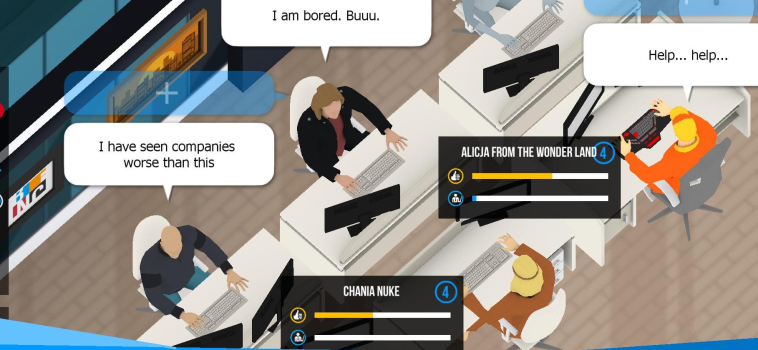Engagement in Learning- Part 2
Engagement in Learning – for Part 1, click here
Engagement and Flow
Game-based learning improves focus and attention because it is often associated with the experience of the mental state of Flow. In his book “Flow: The Psychology of Optimal Experience,” Csíkszentmihályi explains how Flow fosters personal evolution because the challenging activity stretches a person’s abilities. We are told that Flow is a complex psychic event that mobilizes whatever technical, cognitive or performance skills we have, and we operate our best. We are challenged to the top of your skillset in whatever domain we work.
In the game, tasks are progressively challenging enough to require the mobilization of personal skills, thereby promoting high concentration and engagement. This complete focus is possible only when our thoughts, intentions, feelings, and all the senses are focused on the same goal; trying to win the game. Developing greater focus facilitates commitment and trains our attention to be more disciplined. And as we know, any peak performance requires a degree of disciplined concentration.
“In Flow, a person is challenged to do her best and constantly improve her skills. At the time, she doesn’t have the opportunity to reflect on what this means in terms of the self—if she did allow herself to become self-conscious, the experience could not have been very deep. But afterward, when the activity is over and self-consciousness has a chance to resume, the self that the person reflects upon is not the same self that existed before the Flow experience: it is now enriched by new skills and fresh achievements.” – Csikszentmihalyi, 1990
The real power of game-based learning is its ability to create an engaging learning environment and its potential to foster intrinsic motivation. When we pursue enjoyable, exciting activities for the sake of the experience itself, the satisfaction derived from the action itself is the motivational factor.
What are the benefits of using Simulation in Leadership Development?
Contemporary research in motivation shows that intrinsic motivation originates from internal motives and is often experienced as more immediate and potent than extrinsic motivation. It has also been shown that intrinsically motivated goal pursuit has more remarkable long-term outcomes because it satisfies our psychological needs for autonomy and competence, creating more positive states that reinforce the positive feedback loop and increase the likelihood of repetition.
Today we know that intrinsic motivation is more effective and of more enduring value.
Rheinberg and Engeser, in their recent study on motivation and Flow, used the term activity-related motivation as a substitute for intrinsic motivation. They found that positive incentives stemming from learning goal orientation, the experience of competence, interest, and involvement lead to us engaging in activities purely to enjoy it. Professor Csikszentmihalyi, who coined the term Flow, defined it as autotelic or satisfying in itself. The essential characteristic of the Flow experience, commonly shared by those who play games, is its intrinsically motivated nature.
Finally, game-based learning provides immediate feedback, which is crucial to maintaining engagement and intrinsic motivation. And when this feedback is combined into player profiles, like the one generated while playing FLIGBY, it provides an unbiased measurement of players’ skills. As players are wholly engrossed in the game, they are also often unaware that they are being assessed.
Benefits of Game-based Profiling
The interactive movie-based simulations generate a more robust pattern discovery when compared to traditional content and can provide deeper insights from trend analysis. The data collected through the game indicates real-world decisions like the players’ preference for different business strategies or their choices on how to engage with human behavior.
Establishing leadership skill profiles using gameplay data is an unbiased methodology for measuring skills. Sophisticated game-based profiling that generates objective results can be used to solve organizational skills gaps. In FLIGBY, players are given detailed feedback in the form of a 42-page Personal Report at the end of the game built based on the player’s decisions throughout the Game.
Each player can see results reflective of their skillset and managerial performance with various benchmarking options available. The report consists of gameplay results that list the “key performance indicators” (KPIs) and the subjective feedback given by virtual characters on the player’s performance. It also includes a complete leadership skills profile with an unbiased analysis of the player’s 29 Flow-Leadership Skills based on their critical managerial decisions throughout the game.
https://www.fligby.com/simulation-feedback-system/
The main advantage of the unbiased skill measurement, obtained via game-based profiling compared to the other measures typically generated via the standard methods like surveys, is that participants quickly learn “to game” such assessments to their own, and often only presumed advantage. In contrast, playing simulation games like FLIGBY is so absorbing, and how a player’s leadership skills are measured is so hidden that the only way “to the game” the Game is to try to win it.
Business-oriented benefits of game-based profiling are more accurate measurements of fundamental skills used in problem-solving and more robust mapping of unused potential.
There is also a significantly higher acceptance rate of the results by the participants because the measurements are based on less theory and more action. The profiling is linked directly to everyday business situations and decisions, allowing greater active participation and higher involvement.
For even more profound business-oriented benefits, leaders can engage their people managers in a blended learning approach that includes de-briefing the results obtained through the game. This can allow players to apply game-learned problem-solving skills to the real-life context of their respective organizational environment and current problems. Leaders can also use the profiles to map out organizational skills gaps and devise remedial strategies. Predictive people analytics are extremely valuable in today’s rapidly changing business world. One must learn to adapt quickly to changing circumstances while becoming increasingly more aware of incompatibilities in organizational culture.
Conclusion
Game-based learning and profiling are prime examples of today’s most sophisticated and effective leadership development programs. Scientifically designed educational business simulations in interactive movie format, like FLIGBY, include advanced game-based people analytics tools and provide scenario-based experiential learning.
Well-designed and delivered business simulation games are immersive and foster intrinsic motivation and deep learning. When embedded in blended learning solutions, they can extend the benefits of leadership training through pre-work e-learning and post-training de-briefing and coaching for sustained impact. Game-based learning and profiling maximize the impact of leadership training initiatives and can lead to organizational improvement and sustained performance.
Sources
- Csikszentmihalyi, M. (1990). Flow: The Psychology of Optimal Experience. New York, NY: HarperCollins.
- Csikszentmihalyi, M. (2004). Good Business: Leadership, Flow, and the Making of Meaning. New York, NY: Penguin.
- Dale, E. (1954). Audio-Visual Methods in Teaching. New York, NY: A Holt-Dryden Book, Henry Holt, and Company.
- Happ, A. (2016). 5 Elements for a Great Simulation [Blog post].
- Marer, P., Buzady, Z. & Vecsey, Z. (2017). Missing Link Discovered. ALEAS Sims., Los Angeles.
- ON24 and Training Industry, Inc. (2013). Using Virtual Environments for Leadership Development Training.
- Reeve, J. (2015). Understanding motivation and emotion (6th ed.). Hoboken, NJ: Wiley.
- Rheinberg F., Engeser S. (2018). Intrinsic Motivation and Flow. In: Heckhausen J., Heckhausen H. (eds) Motivation and Action. Springer.
About the Author of this entry

Beata Souders, MSPP, and ACC; Reach her at www.michelangelophenomenon.com
Beata is a positive psychology practitioner, an ICF-certified coach, and a doctoral candidate in clinical psychology at California Southern University. Her current research and writing focus on the psychology of motivation, applications of the flow theory to employee engagement and leadership development, and issues in telemental health. She holds a Master’s in Positive Psychology from Life University and frequently contributes to PositivePsychology.com. Beata is an accomplished wellness and HR professional, a founder of Michelangelo Coaching, an assistant trainer at the Institute of Professional Excellence in Coaching, a founding member of the Association of Positive Psychology Coaches, a Gottman Institute Certified Educator, and a member of the European Flow Researchers Network, APA and IPPA. You can reach her at www.michelangelophenomenon.com





